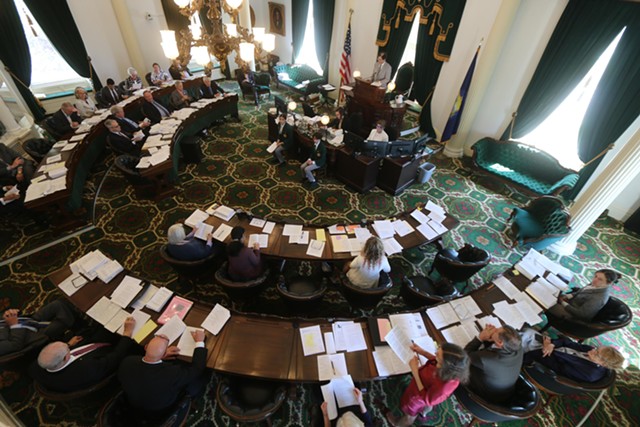
- Caleb Kenna
- A solar field in Sudbury
Lawmakers gave final approval to a bill that will accelerate the state’s transition toward clean energy by requiring utilities to get 100 percent of their power from renewable sources by 2035.
The bill, H.289, was lauded by environmental groups but blasted by Republicans concerned about the costs. It faces a likely veto by Gov. Phil Scott and an override when the legislature returns in June.
“Today’s vote shows that most Senators agree that increasing our reliance on renewable energy makes sense both environmentally and economically,” Peter Sterling, executive director of Renewable Energy Vermont, said in a statement.
The bill has broad support among utilities, including Burlington Electric Department, which claims it is already 100 percent renewable, and Green Mountain Power, which says it is on track to get there by 2030.
But Scott and Republican lawmakers have argued that the bill will impose unnecessary costs on Vermonters.
The legislature’s Joint Fiscal Office has offered a wide range of cost estimates for the bill, from between $150 million and $450 million over the next decade, or from $4 to $16 per month for the average household by 2035.
It warned, however, of “considerable uncertainty” in those estimates, which Sen. Russ Ingalls (R-Essex) said are “all over the place.”
Sen. Chris Bray (D-Addison), countered that one of the reasons for the difficulty of predicting future energy costs is that most New England power plants run on natural gas, which is prone to spikes in cost.
 The bill would not only lower carbon emissions from fossil fuels but would end the “roller-coaster ride” of fuel price swings, Bray said.
The bill would not only lower carbon emissions from fossil fuels but would end the “roller-coaster ride” of fuel price swings, Bray said.
The Department of Public Service proposed other ways to update the law, known as the state's renewable energy standard. But lawmakers rejected them, partly to avoid increasing the state's reliance on nuclear power.
Strong majorities in both chambers agreed that the bill’s cost increases were modest compared to its environmental benefits.
“While Vermonters do value affordability, we also value reducing our carbon, and this bill strikes that balance," Sen. Anne Watson (D/P-Washington) said during debate on the bill last week.
She noted that analysts called the cost of the bill in 2025 "insignificant."
Sen. Andrew Perchlik (D/P-Washington) called it inconsistent for senators to support a bill designed to make big oil companies pay for the environmental damage from selling fossil fuels — as most did recently — while not supporting a bill designed to help the state get off those fuels.
“If we think they are responsible for their past actions, we have to be responsible for our actions now,” he said.
The bill, H.289, was lauded by environmental groups but blasted by Republicans concerned about the costs. It faces a likely veto by Gov. Phil Scott and an override when the legislature returns in June.
“Today’s vote shows that most Senators agree that increasing our reliance on renewable energy makes sense both environmentally and economically,” Peter Sterling, executive director of Renewable Energy Vermont, said in a statement.
The bill has broad support among utilities, including Burlington Electric Department, which claims it is already 100 percent renewable, and Green Mountain Power, which says it is on track to get there by 2030.
But Scott and Republican lawmakers have argued that the bill will impose unnecessary costs on Vermonters.
The legislature’s Joint Fiscal Office has offered a wide range of cost estimates for the bill, from between $150 million and $450 million over the next decade, or from $4 to $16 per month for the average household by 2035.
It warned, however, of “considerable uncertainty” in those estimates, which Sen. Russ Ingalls (R-Essex) said are “all over the place.”
Sen. Chris Bray (D-Addison), countered that one of the reasons for the difficulty of predicting future energy costs is that most New England power plants run on natural gas, which is prone to spikes in cost.

- Kevin McCallum
- The Vermont Senate on Tuesday
The Department of Public Service proposed other ways to update the law, known as the state's renewable energy standard. But lawmakers rejected them, partly to avoid increasing the state's reliance on nuclear power.
Lawmakers’ views varied widely. Sen. Terry Williams (R-Rutland) based his opposition in part on the premise that fossil fuels will be a major part of the world energy supply for at least the next 30 years. He came to this conclusion, he said, “from a conversation I had with an engineer from ExxonMobil.”
Strong majorities in both chambers agreed that the bill’s cost increases were modest compared to its environmental benefits.
“While Vermonters do value affordability, we also value reducing our carbon, and this bill strikes that balance," Sen. Anne Watson (D/P-Washington) said during debate on the bill last week.
She noted that analysts called the cost of the bill in 2025 "insignificant."
Sen. Andrew Perchlik (D/P-Washington) called it inconsistent for senators to support a bill designed to make big oil companies pay for the environmental damage from selling fossil fuels — as most did recently — while not supporting a bill designed to help the state get off those fuels.
“If we think they are responsible for their past actions, we have to be responsible for our actions now,” he said.









Comments
Comments are closed.
From 2014-2020, Seven Days allowed readers to comment on all stories posted on our website. While we've appreciated the suggestions and insights, right now Seven Days is prioritizing our core mission — producing high-quality, responsible local journalism — over moderating online debates between readers.
To criticize, correct or praise our reporting, please send us a letter to the editor or send us a tip. We’ll check it out and report the results.
Online comments may return when we have better tech tools for managing them. Thanks for reading.